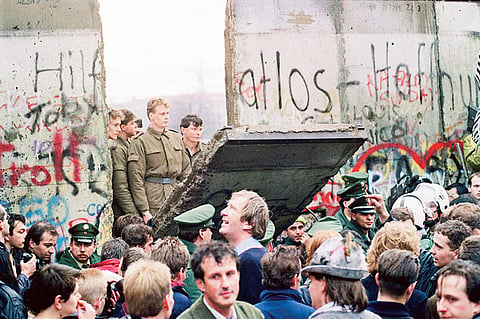Berlin: A look back in time
It has taken many years for the Easterners to feel equal and it still is an issue today

Duba: I first visited Berlin in 1988 and sat next to the Mayor of Berlin at a formal dinner which was the high point of a European financial services conference. He spoke at length of how he saw a glowing future for Berlin at the heart of Europe, and I privately thought he was dreaming in his small outpost of freedom in the heart of Communist Europe.
I could not imagine his vision of Central Europe could ever return. I grew up in the Europe that was divided by the post World War Two settlement and my Europe stopped at the Iron Curtain. On the other side was Communism and very strange ideas that were certainly not part of the free continent that I identified as home.
Thinking of Berlin as the centre of Europe seemed as outdated as the talking of the Germany of Bismark or its rival Austrian Hungarian Empire.
On my visit I had spent a few days wandering around West Berlin and could not get my bearings sorted out. I visited the main shopping street of the Ku’damm, I walked the parks, and visited some bars, but the city seemed strangely centreless.
On my last day, I crossed through Checkpoint Charlie to visit East Berlin which was under the control of Communist East Germany, That is where I finally found the centre of the divided city: Unter den Linden and the Brandenburg Gate were so obviously where the city’s street plan centred on and where Berlin had its soul, but from which the West was kept out by the Berlin Wall.
On that same visit to the East I took a taxi ride and saw the grim concrete apartment towers in East Berlin’s suburbs, and I was overwhelmingly conscious of the mechanical utilitarianism of East Germany and the complete lack of any individuality that is the core of Western Europe’s spirit of innovation and individualism. East Germany was a very foreign country.
Less than one year later, on a rainy evening in London in November 1989, I hurried home to watch the news on TV. We all knew that something strange was happening in Berlin but it was unbelievable to see the East Germans pouring over the wall and pulling it apart with their hands, as the guards, who had shot so many people trying to escape, simply stood and watched.
Bravery
The bravery of the people was astonishing and brought tears to my eyes because the people we were watching climb over the Wall did not know whether their military might change their minds at any time, and crack down on them with brutal force.
Watching the end of the Wall allowed us all to share in a seminal moment of European history as Communism collapsed and a new chapter started as all the nations of Europe joined to seek prosperity and freedom together.
Three years later in 1991, I went back to a reunited Berlin and found an astonishingly optimistic Germany seeking to reunite despite huge problems. One of the first places I visited was the vast labyrinth of the Treuhand Anstalt, Trust Agency, that was the government holding body that took over responsibility for more than 8,500 East German companies with more than 4 million employees, and slowly found new owners and introduced them to the market economy.
The Treuhand sent me to visit the factories of the American lift manufacturer Otis, and the razor company Gillette, that had been under Communist control for more than 45 years since the Russians conquered what became East Germany in the Second World War.
It was bizarre to interview the newly appointed American managers who were struggling to understand how well-established East German companies had no experience at all of the global market.
Everything that we assumed was the business norm did not apply. For example, both managements told me how they were really struggling since East Germany had no computer skills at all. All book-keeping was on paper, and all the manufacturing was mechanical.
A whole economy had been forced to ignore the computer revolution that had been transforming production techniques across the global market.
In addition, no one in the thousands employed by these two companies had any sales knowledge. In East Germany their task had been to produce and distribute as required by the ministries, and even senior managers were totally unaware of the market disciplines of cost and profit, and in fact found them quite distasteful.
Powerful decision
It has taken many years for the Ostis, Easterners, as they were condescendingly called by their richer and far more street-smart Western compatriots, to feel equal and it still is an issue today.
But the successful reunification started with the extraordinary decision by German Chancellor Helmut Kohl who decided to overrule the traditionally all-powerful Bundesbank and forced it to convert all East Marks into Deutschmarks at a conversion of one to one, which they were certainly not worth in a true market.
This powerful political decision gave Germany years of fiscal problems as it absorbed the East German economy but it was vital for the successful merger of the two sundered halves of one country.
It led to a more confident whole and, in time, encouraged easterners to join business and politics and now Germany has Angela Merkel, a former Osti as Chancellor, who has unrivalled international respect as the political leader of the entire European Union.
Sign up for the Daily Briefing
Get the latest news and updates straight to your inbox



